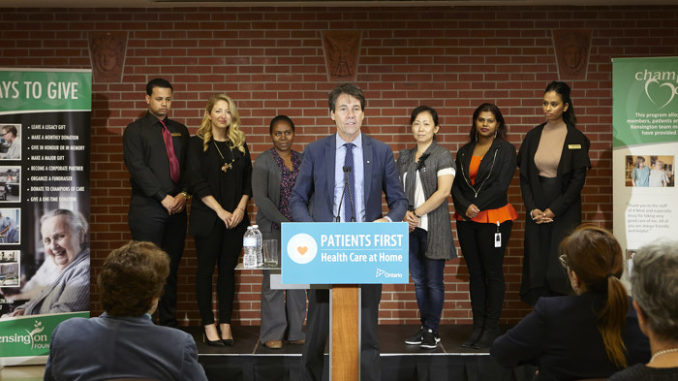
Patients, Families to Benefit from 2.6 Million More Hours of Home Care Across Province
Ontario is strengthening home and community care across the province for patients and their families, by increasing access to services by an estimated 2.6 million additional hours and developing new patient- and family-friendly supports.
Dr. Eric Hoskins, Minister of Health and Long-Term Care, was at Kensington Gardens in Toronto to announce a major new expansion of home care supports and services across Ontario.
With this expansion, home care patients and those who care for them will benefit from approximately:
- 1.5 million additional hours of personal support services, which includes help with bathing, dressing and exercising.
- 390,000 additional hours of nursing care, which includes one-on-one care from a nurse for services such as palliative care, wound care and dressing changes.
- 110,000 additional hours of therapy, which includes speech and language therapy, occupational therapy and physiotherapy services.
- 600,000 additional hours of respite services for caregivers, such as personal support or nursing, so that they can schedule breaks for rest, family commitments or other priorities.
The province will also be:
- Creating new, innovative self-directed care models to provide eligible clients and caregivers with more control over their care. This will include the establishment of a new personal support services organization in early 2018.
- Launching a new caregiver organization in spring 2018, which will provide support and resources across the province, including a single access point for information, resources and services to help them in their roles.
- Introducing a new framework for home-care assessments and planning based on the level of care needed by an individual, to improve consistency and transparency of available services. The framework will give clients and caregivers more predictability about how much home care they have access to.
- Providing additional funding for community supports, such as meals on wheels and day programs that support clients and caregivers.
Ontario is increasing access to care, reducing wait times and improving the patient experience through its Patients First Action Plan for Health Care and OHIP+: Children and Youth Pharmacare Program – protecting health care today and into the future.
Quick Facts
- Ontario is investing an additional $100 million in 2017-18 in home care supports and services.
- Ontario is also investing an additional $18 million in 2017-18 for community supports, such as meals on wheels, day programs, caregiver supports and assisted living services.
- Home and community care services support people of all ages who require care in their home or in the community.
- The province will launch a new registry that will provide patients and families with easy-to-access information about their personal support workers.
- Last year home care services helped over 660,000 people in Ontario live independently.
- The province’s Statement of Home and Community Care Values is a statement of shared values to guide the planning and delivery of home care services, ensuring the needs and priorities of clients and caregivers are reflected in the care they receive.
Additional Resources
Quotes
“More people across Ontario are being supported to live independently at home than ever before. By transforming the home care system to provide supports to clients and their caregivers that better meet their needs, we’re creating a system that will deliver better results and that people can have confidence in.”
“We know people want to live at home as long as possible. We know that they need support to do that, and we also know that we need to support the caregivers who are caring for them in the community. More dedication to home and community care is essential to ensuring people can continue to live well.”
Bill O’Neill


Leave a Reply